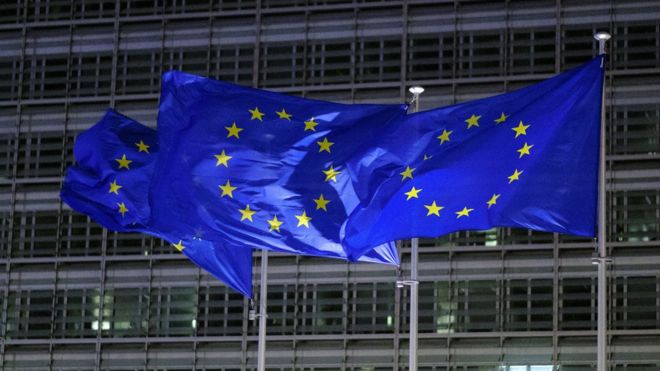
- Ministers from the EU will meet later to approve their mandate for post-Brexit trade talks with the UK.
Ministers from the EU will meet later to approve their mandate for post-Brexit trade talks with the UK.
The document approved by the EU General Affairs Council on Tuesday morning will be the basis for future negotiations, to be carried out by Michel Barnier.
It will say that a trade deal should be based on EU rules in some areas as “a reference point”.
Meanwhile, UK ministers will also meet at No 10 to discuss the government’s opening stance for negotiations.
The final agreement is due to be published online and presented in Parliament on Thursday.
Nathalie Loiseau, an MEP for French President Emmanuel Macron’s La République En Marche! party, said the bloc wanted clarity about what the UK wanted to achieve in trade talks.
“If you would like to lower the standards [in areas such as food, farming], there would be mechanism to protect us from any sort of unfair competition,” she told BBC Radio 4’s Today programme.
“But the question I would like to ask is: what sort of discussion will your government have with other trade partners? Will you abide to American standards in terms of consumer protection for instance? This is still unclear to me.”
It is expected that ministers in the UK will commit to seeking a Canada-style agreement with zero tariffs, a proposal Mr Johnson and his Europe adviser David Frost have set out in speeches in recent weeks.
But the push for a Canada-style deal could set up a clash with the EU after its chief negotiator Mr Barnier ruled out such an agreement.
Mr Barnier has previously said the UK is too close in proximity to be permitted to compete with the other 27 member states on such terms.
And Ms Loiseau said that “to my knowledge the UK is not Canada”, adding that the EU-UK relationship is “very different” from the one with Canada.
Mr Johnson will chair his EU Exit Strategy (XS) committee later, which includes new Chancellor Rishi Sunak, Foreign Secretary Dominic Raab, senior Cabinet minister Michael Gove and new Attorney General Suella Braverman. All supported the Vote Leave campaign in 2016.
The prime minister’s official spokesman, asked about the trade talks on Monday, said: “The UK’s primary objective in the negotiations is to ensure that we restore our economic and political independence on 1 January 2021.”
Mr Frost and his team will head to Brussels for the first round of negotiations on 2 March.
One clash expected with the forthcoming publication of the EU’s negotiation mandate is on fishing, with leading member states speaking regularly about wanting continued access to UK waters.
In a speech in Greenwich, south-east London, earlier this month Mr Johnson announced that, once free of the EU’s Common Fisheries Policy, “British fishing grounds are first and foremost for British boats”.
But French Europe minister Amelie de Montchalin signalled fishing would be a flash point when the two negotiating teams come together in London and Brussels over the coming months.
“The fishermen have the right to be protected, they know very well that if we sign a bad deal they will lose enormously,” she told TV station France 2.
A leaked draft of the EU negotiation mandate last week also included a stipulation that the UK should “return unlawfully removed cultural objects to their countries of origin”.
The passage is thought to refer to the Elgin Marbles, ancient Greek sculptures taken to Britain more than 200 years ago and now on display in the British Museum.
Downing Street has insisted the future of the marbles is “not up for discussion as part of our trade negotiations”.
The prime minister is expected to meet Austrian Chancellor Sebastian Kurz in No 10 on Tuesday as part of his diplomatic efforts with EU leaders before talks commence.
On Monday, Mr Johnson discussed the negotiations with his Croatian counterpart Andrej Plenkovic, whose country holds the rotating presidency of the Council of the European Union.
Downing Street said the PM highlighted the UK was “not seeking a special or bespoke agreement, but rather one like those the EU has already struck with other friendly countries like Canada”.
The No 10 spokesman added: “He emphasised that the UK will not extend the transition period or accept any arrangements which subordinate us to EU rules.”
The transition period runs until 31 December 2020, during which time the UK continues follow EU rules – including freedom of movement.
It is intended to allow time for the UK and the EU to agree a post-Brexit trade agreement.



